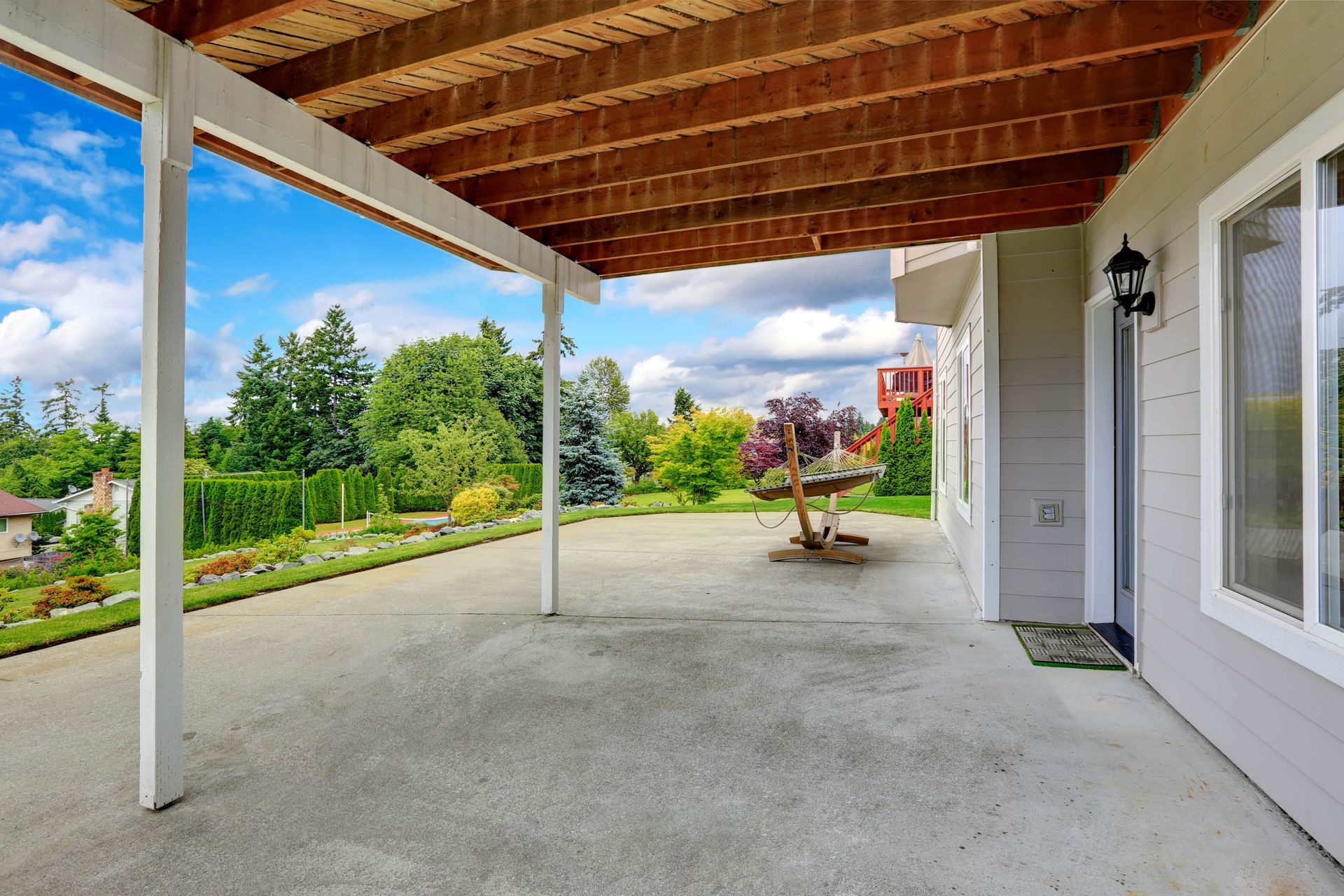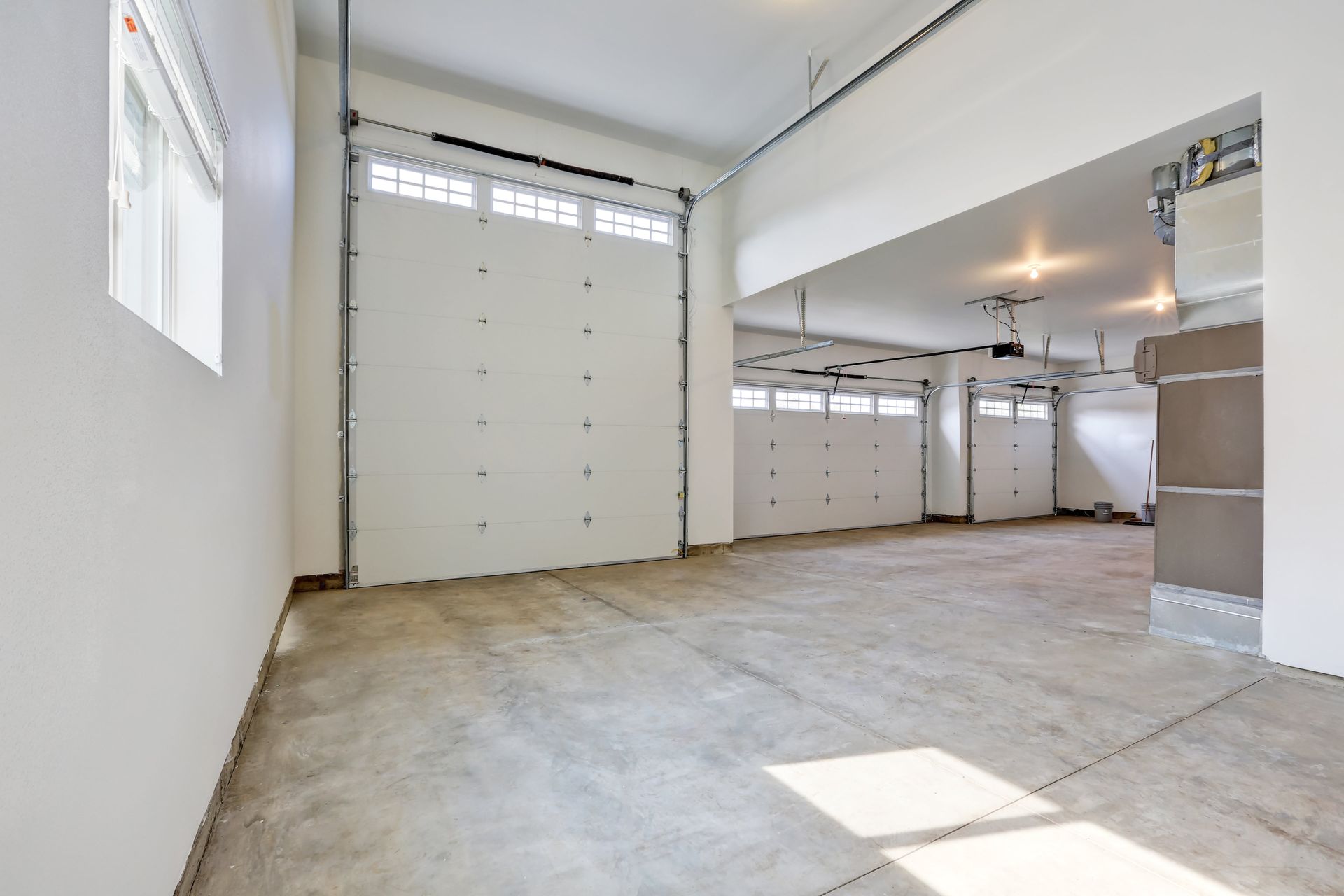The Future of Concrete Construction in Atlanta: Innovations and Trends
July 9, 2024
Concrete has long been a cornerstone of construction, providing durability, strength, and versatility. As we look to the future, the concrete industry is undergoing significant transformations driven by technological advancements and sustainability concerns. At Stone Mountain Concrete, we're at the forefront of these changes, bringing innovative solutions to the Atlanta area. Here’s a look at the trends and innovations shaping the future of concrete construction in Atlanta.
1. Sustainable Concrete Practices
Sustainability is no longer a niche concern; it’s becoming a central focus in construction. Traditional concrete production is energy-intensive and contributes to carbon emissions. However, new methods are being developed to produce more eco-friendly concrete.
One promising innovation is the use of supplementary cementitious materials (SCMs) such as fly ash, slag, and silica fume, which reduce the amount of cement required. Additionally, carbon capture and utilization technologies are being integrated into concrete production, capturing CO2 emissions and incorporating them into the concrete mix.
2. Self-Healing Concrete
Imagine concrete that can repair its own cracks without human intervention. Self-healing concrete is a groundbreaking innovation that could revolutionize the industry. This type of concrete contains microcapsules filled with healing agents such as bacteria or polymers. When cracks form, these capsules break open, releasing the healing agents that fill and seal the cracks.
Self-healing concrete can significantly extend the lifespan of structures, reduce maintenance costs, and improve safety. While still in the experimental stage, it holds immense potential for the future of concrete construction in Atlanta and beyond.
3. 3D Printing with Concrete
3D printing is transforming various industries, and construction is no exception. 3D-printed concrete structures offer numerous benefits, including reduced material waste, faster construction times, and enhanced design flexibility.
In Atlanta, we’re starting to see the potential of 3D printing in building affordable housing, complex architectural designs, and even infrastructure projects. The precision of 3D printing allows for intricate details that are difficult to achieve with traditional methods, opening up new possibilities for creativity and efficiency in construction.
4. Ultra-High Performance Concrete (UHPC)
Ultra-high performance concrete (UHPC) is a new class of concrete that boasts exceptional strength, durability, and flexibility. UHPC incorporates fine powders, fibers, and high cement content, resulting in a material that can withstand extreme conditions and heavy loads.
UHPC is ideal for use in bridges, high-rise buildings, and other infrastructure projects that require superior performance. Its longevity and reduced maintenance needs make it a cost-effective choice in the long run, and we anticipate its increasing use in Atlanta’s future construction projects.
5. Smart Concrete Technology
The integration of smart technology into concrete construction is paving the way for intelligent infrastructure. Smart concrete contains sensors that monitor various parameters such as temperature, humidity, strain, and structural health. This data is transmitted to a central system for analysis, allowing for real-time monitoring and proactive maintenance.
Smart concrete can enhance the safety and longevity of buildings and infrastructure by detecting issues early and enabling timely interventions. As Atlanta continues to grow, incorporating smart concrete into new constructions can help ensure the city's infrastructure remains resilient and reliable.
6. Recycled Concrete Aggregates
Recycling old concrete into new construction materials is another sustainable practice gaining traction. Recycled concrete aggregates (RCA) are created by crushing old concrete and using it as a replacement for natural aggregates in new concrete mixes.
This practice not only reduces the demand for virgin materials but also helps divert construction waste from landfills. RCA can be used in a variety of applications, from road bases to new concrete structures, promoting a circular economy within the construction industry.
Conclusion
The future of concrete construction in Atlanta is bright, with numerous innovations and trends reshaping the industry. At Stone Mountain Concrete, we’re committed to staying at the forefront of these advancements, bringing the latest technologies and sustainable practices to our projects. By embracing these innovations, we can build a more resilient, eco-friendly, and efficient Atlanta.
Whether you’re planning a new construction project or looking to upgrade existing structures, Stone Mountain Concrete is here to help you navigate the future of concrete construction. Contact us today to learn more about how we can bring cutting-edge solutions to your next project and contribute to the sustainable growth of our city.
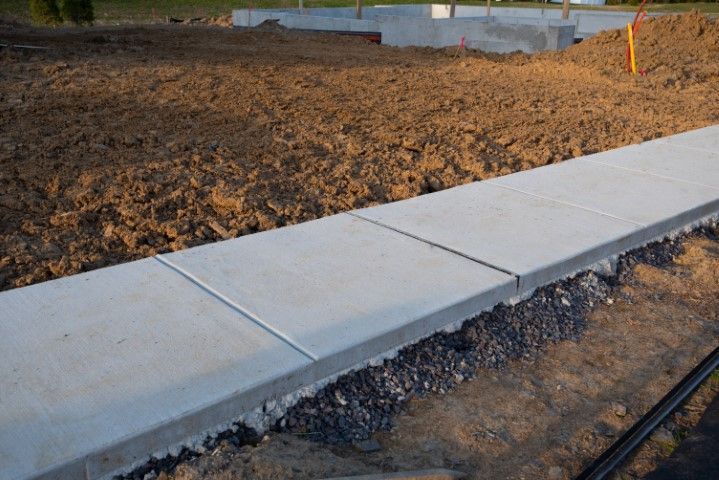
September 8, 2024
Concrete floors are a popular choice for their durability, versatility, and modern aesthetic. However, the cost of installing a concrete floor can vary significantly depending on several factors. In this blog, we'll break down the various elements that influence the cost of concrete floor installation, helping you understand what to expect and how to budget for your project. 1. Type of Concrete The type of concrete you choose plays a significant role in the overall cost. Here are a few common options: Standard Concrete: Basic, gray concrete is the most affordable option. It typically costs between $2 to $5 per square foot for materials. Polished Concrete: This involves grinding and polishing the surface to a high-gloss finish, adding $3 to $12 per square foot. Stained Concrete: Adding color through staining can cost between $2 to $25 per square foot, depending on the complexity and number of colors. Stamped Concrete: Mimicking the look of brick, stone, or tile, stamped concrete can cost $8 to $18 per square foot. 2. Substrate Preparation The condition of the existing floor or substrate impacts the cost of installation. Proper preparation is crucial for a successful concrete floor installation. Demolition and Removal: Removing an existing floor can add $1 to $3 per square foot. Surface Cleaning and Repair: Cleaning and repairing the substrate can range from $1 to $5 per square foot, depending on the extent of damage. Leveling: If the substrate is uneven, leveling compounds may be needed, adding $2 to $5 per square foot. 3. Thickness of the Concrete The thickness of the concrete slab affects both material costs and labor. Standard residential floors are usually 4 inches thick, but this can vary based on the application. Standard Thickness (4 inches): Generally costs $4 to $8 per square foot. Increased Thickness: Thicker slabs for industrial or heavy-use areas can cost $8 to $15 per square foot. 4. Design and Finish The complexity of the design and finish can significantly influence the cost. Customization options include: Simple Finishes: Basic finishes like a smooth trowel or broom finish are more affordable, costing $2 to $5 per square foot. Decorative Finishes: Techniques such as staining, stamping, or engraving can add $5 to $25 per square foot, depending on the complexity. Inlays and Patterns: Adding decorative elements like inlays, borders, or patterns can increase costs by $10 to $30 per square foot. 5. Size of the Area The size of the area to be covered with concrete affects both material costs and labor. Larger projects typically have a lower cost per square foot due to economies of scale. Small Areas (under 500 sq ft): Higher cost per square foot, typically $6 to $12. Medium Areas (500 to 1,000 sq ft): Moderate cost per square foot, around $5 to $10. Large Areas (over 1,000 sq ft): Lower cost per square foot, generally $4 to $8. 6. Labor Costs Labor costs can vary based on the complexity of the project, the region, and the experience of the contractor. Basic Installation: Simple installations with minimal design typically cost $2 to $5 per square foot for labor. Complex Installation: Projects involving decorative finishes or extensive preparation can cost $5 to $15 per square foot for labor. 7. Additional Factors Several other factors can influence the overall cost of concrete floor installation: Geographical Location: Costs can vary significantly based on local labor rates and material availability. Time of Year: Seasonal demand can affect prices, with peak construction seasons typically being more expensive. Permits and Inspections: Depending on local regulations, permits and inspections may add to the cost. Sealing and Maintenance: While not part of the initial installation cost, regular sealing and maintenance are necessary to preserve the floor's appearance and durability, costing $0.50 to $1.50 per square foot annually. Conclusion Understanding the cost factors involved in concrete floor installation can help you budget more effectively and make informed decisions about your project. At Stone Mountain Concrete Co., we are committed to providing high-quality concrete flooring solutions tailored to your specific needs and budget. Our team of experienced professionals will work with you to create a beautiful, durable floor that enhances the value and aesthetics of your space. For a detailed estimate or to discuss your project, contact Stone Mountain Concrete Co. today. Let us help you achieve the perfect concrete floor for your home or business.

August 24, 2024
Concrete floors have emerged as a hallmark of contemporary design, offering both functionality and aesthetic appeal. As homeowners and designers seek innovative ways to elevate interior spaces, concrete flooring has proven to be a versatile and stylish choice. In this blog, we'll explore the latest trends in concrete floor designs and how they can transform modern home interiors. 1. Polished Concrete: Sleek and Sophisticated Polished concrete floors have gained immense popularity for their sleek, reflective surface that adds a touch of sophistication to any room. The polishing process involves grinding the concrete surface to achieve a high-gloss finish, which not only looks stunning but also enhances the durability of the floor. Benefits: Low Maintenance: Polished concrete is easy to clean and requires minimal upkeep. Durability: The polishing process strengthens the concrete, making it resistant to scratches and stains. Versatility: Suitable for various spaces, including living rooms, kitchens, and hallways. Applications: Modern Living Rooms: Polished concrete provides a sleek, minimalist backdrop that complements contemporary furniture and décor. Kitchens: Its reflective surface can brighten up the space, making it appear larger and more open. 2. Stained Concrete: Vibrant and Dynamic Stained concrete floors offer a unique way to introduce color and visual interest into your home. Acid-based stains react chemically with the concrete to create natural, variegated colors, while water-based stains provide more consistent and vibrant hues. Benefits: Customization: A wide range of colors and patterns can be achieved, allowing for personalized designs. Aesthetic Appeal: Stained concrete can mimic the look of natural stone, marble, or even wood. Applications: Entryways: Make a bold statement with a richly stained concrete floor that impresses guests as soon as they walk in. Bathrooms: Stained concrete can create a luxurious spa-like atmosphere, especially when combined with other natural materials like wood and stone. 3. Stamped Concrete: Textured and Tactile Stamped concrete floors are a great way to add texture and visual interest to your interiors. This technique involves pressing patterns into the concrete while it's still wet, creating the look of brick, slate, tile, or even wood. Benefits: Variety: A wide array of patterns and textures can be achieved to suit different design preferences. Affordability: Stamped concrete provides the look of high-end materials at a fraction of the cost. Applications: Patios and Outdoor Spaces: Stamped concrete is perfect for creating stylish and durable outdoor living areas. Dining Rooms: Bring a touch of rustic charm to your dining space with a stamped concrete floor that mimics the look of natural stone. 4. Exposed Aggregate: Raw and Natural Exposed aggregate concrete floors showcase the natural beauty of the stones and pebbles embedded within the concrete. The top layer of the concrete is removed to reveal the aggregate, creating a textured and visually appealing surface. Benefits: Aesthetic Appeal: The exposed stones add a unique and natural look to the floor. Slip Resistance: The textured surface provides additional grip, making it a safe choice for high-traffic areas. Applications: Hallways and Corridors: Exposed aggregate floors can add visual interest and texture to long, narrow spaces. Garden Paths: Extend the natural look to your outdoor areas with exposed aggregate paths and walkways. 5. Metallic Epoxy: Bold and Dramatic Metallic epoxy floors are a striking option for those looking to make a bold statement. This technique involves applying a metallic epoxy coating to the concrete surface, creating a glossy, three-dimensional effect that can mimic the look of flowing water or molten metal. Benefits: Unique Look: Each metallic epoxy floor is one-of-a-kind, offering a truly unique design. High Gloss Finish: The reflective surface adds depth and dimension to the room. Applications: Living Areas: Create a dramatic focal point in your living room or entertainment area with a metallic epoxy floor. Home Offices: Add a touch of modern luxury to your workspace with a sleek, metallic finish. 6. Microtopping: Smooth and Seamless Microtopping is a thin layer of polymer-modified concrete applied over an existing surface to create a smooth, seamless finish. This technique is ideal for renovating old floors or creating a sleek, contemporary look. Benefits: Versatility: Microtopping can be applied to various substrates, including wood, tile, and concrete. Customization: Available in a wide range of colors and finishes to suit any design style. Applications: Bedrooms: Achieve a clean, minimalist look in your bedroom with a seamless microtopping floor. Bathrooms: Create a modern, spa-like atmosphere with a smooth, polished microtopping surface. Conclusion Innovative concrete floor designs offer endless possibilities for transforming modern home interiors. From sleek polished finishes to textured stamped patterns, concrete floors can be customized to suit any style and preference. At Stone Mountain Concrete Co., we specialize in creating stunning, personalized concrete floors that elevate the beauty and functionality of your home. For more information or to discuss your project, contact Stone Mountain Concrete Co. today. Let us help you explore the latest trends and innovative designs in concrete flooring.
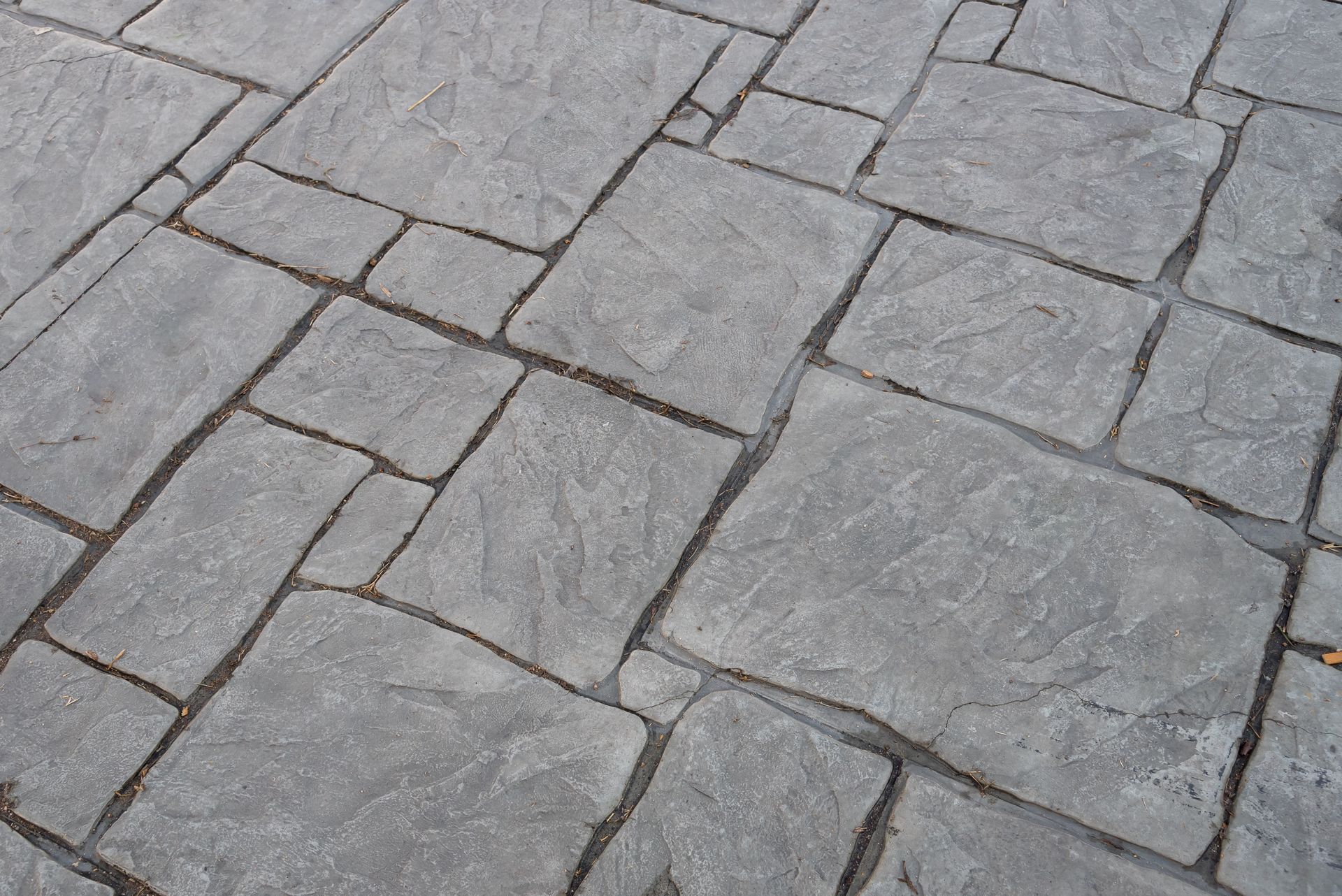
August 17, 2024
Self-leveling concrete floors have become a popular choice for both residential and commercial applications due to their smooth finish, durability, and ease of installation. The technology behind self-leveling concrete is fascinating, and understanding the process and its applications can help you make informed decisions about incorporating this innovative flooring solution into your space. In this blog, we'll delve into the science behind self-leveling concrete floors, explaining the technology, process, and various applications. What is Self-Leveling Concrete? Self-leveling concrete is a specially formulated cementitious mixture that flows and spreads evenly under its own weight, creating a flat and smooth surface without the need for extensive manual leveling. Unlike traditional concrete, which can be difficult to work with and requires significant troweling, self-leveling concrete is designed to be highly fluid and easy to apply. The Technology Behind Self-Leveling Concrete The key to self-leveling concrete lies in its unique formulation. Here are the primary components and technologies involved: Polymer Modifiers: Self-leveling concrete contains polymer modifiers that enhance its flowability and adhesion properties. These polymers improve the material's ability to spread evenly and bond to various substrates, including concrete, wood, and metal. High-Performance Additives: Special additives are included to control the setting time, reduce shrinkage, and improve the overall strength and durability of the finished floor. These additives ensure that the self-leveling concrete cures properly and maintains its integrity over time. Superplasticizers: Superplasticizers are chemical compounds that increase the fluidity of the concrete mix without adding extra water. This helps achieve the desired consistency for self-leveling while maintaining the material's strength and durability. Fine Aggregates: The mixture includes fine aggregates, such as sand or crushed stone, to provide additional strength and stability. The small size of these aggregates allows for a smoother finish compared to traditional concrete. The Process of Installing Self-Leveling Concrete Floors The installation process for self-leveling concrete floors is straightforward but requires careful preparation and execution. Here are the key steps involved: Surface Preparation: The substrate must be clean, dry, and free of any contaminants such as oil, grease, or dust. Any cracks or holes should be repaired, and a primer may be applied to enhance adhesion. Mixing: The self-leveling concrete mixture is prepared according to the manufacturer's instructions. It is crucial to mix the components thoroughly to achieve the correct consistency and performance characteristics. Pouring: The mixed self-leveling concrete is poured onto the prepared substrate. Due to its high fluidity, it will flow and spread evenly, filling in low spots and creating a level surface. Spreading: While the material is designed to level itself, it may need some assistance in spreading. Tools such as a gauge rake or a smoothing trowel can be used to ensure even distribution and eliminate air bubbles. Curing: The self-leveling concrete needs time to cure properly. The curing time can vary depending on the specific product and environmental conditions, but it typically ranges from a few hours to a day before it is walkable. Full curing may take several days. Applications of Self-Leveling Concrete Floors Self-leveling concrete floors are versatile and can be used in a variety of applications, including: Residential Spaces: Basements: Ideal for creating a smooth and moisture-resistant surface in basements, self-leveling concrete can be finished with stains, dyes, or sealers for an attractive look. Living Areas: Self-leveling concrete provides a modern, seamless floor that can be customized with different finishes to complement interior design. Commercial Spaces: Retail Stores: The smooth, durable surface of self-leveling concrete is perfect for high-traffic areas in retail stores. It can be finished with epoxy coatings or polished for a sleek appearance. Offices: Self-leveling concrete floors in offices offer a professional and clean look. They can be easily maintained and customized with various finishes. Industrial Spaces: Warehouses: Self-leveling concrete is suitable for warehouses due to its durability and ability to withstand heavy loads. It provides a flat surface that is essential for the safe operation of machinery and equipment. Manufacturing Facilities: In manufacturing environments, self-leveling concrete can be used to create smooth, durable floors that resist chemicals, abrasion, and imp Renovation Projects: Floor Leveling: Self-leveling concrete is often used to correct uneven floors in renovation projects. It provides a solid foundation for installing other types of flooring, such as tile, carpet, or hardwood. Overlay Systems: It can be applied as an overlay to existing concrete floors to improve appearance and performance without the need for complete replacement. Conclusion The technology and process behind self-leveling concrete floors make them an excellent choice for a wide range of applications. At Stone Mountain Concrete Co., we specialize in installing high-quality self-leveling concrete floors that meet your specific needs and preferences. Whether you're looking to level a basement floor, upgrade a commercial space, or enhance an industrial facility, our team of experts can provide the perfect solution. For more information or to discuss your project, contact Stone Mountain Concrete Co. today. Let us help you explore the benefits and possibilities of self-leveling concrete floors.
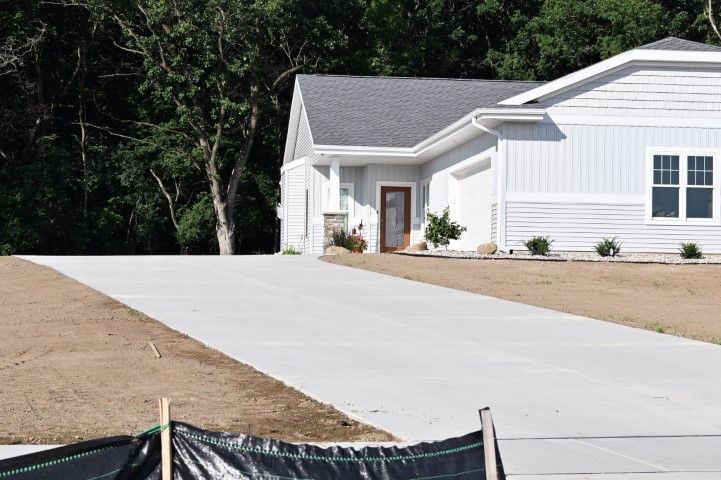
August 10, 2024
Choosing the right flooring for your home or business involves weighing various factors such as cost, durability, and aesthetics. Concrete floors have gained popularity for their versatility and robustness, but how do they stack up against other common flooring options like hardwood, tile, and carpet? In this blog, we'll provide a comparative analysis to help you make an informed decision. Cost Comparison Concrete Floors: Initial Cost: The cost of concrete flooring can vary depending on the complexity of the design and finish. Basic polished concrete can range from $2 to $6 per square foot, while more intricate designs or staining can increase the price to $8 to $15 per square foot. Long-Term Cost: Concrete floors are low-maintenance and have a long lifespan, which can result in cost savings over time. Hardwood Floors: Initial Cost: Hardwood flooring typically costs between $6 and $12 per square foot for materials and installation. High-end woods or custom designs can increase the price significantly. Long-Term Cost: Hardwood floors require regular maintenance, such as refinishing every few years, which can add to the long-term costs. Tile Floors: Initial Cost: Tile flooring can range from $5 to $10 per square foot for standard ceramic tiles. Porcelain or natural stone tiles can cost between $10 and $20 per square foot. Long-Term Cost: Tiles are relatively low-maintenance but may require occasional regrouting or replacement of cracked tiles. Carpet: Initial Cost: Carpet is generally the most affordable option, with prices ranging from $2 to $5 per square foot for standard carpeting. High-end or specialty carpets can cost more. Long-Term Cost: Carpet needs regular cleaning and may need to be replaced every 5 to 10 years, depending on wear and tear. Durability Comparison Concrete Floors: Durability: Concrete is one of the most durable flooring options available. It can withstand heavy traffic, resist scratches and stains, and last for decades with minimal maintenance. Maintenance: Routine sweeping and occasional mopping are typically sufficient. Sealing the concrete can further protect it from stains and wear. Hardwood Floors: Durability: Hardwood is durable but can be prone to scratches, dents, and moisture damage. Proper care can extend its lifespan. Maintenance: Regular sweeping and occasional refinishing are necessary to maintain its appearance. Tile Floors: Durability: Tiles are highly durable and resistant to water and stains. However, they can crack or chip if heavy objects are dropped on them. Maintenance: Tiles are easy to clean, but grout lines may require periodic resealing to prevent staining. Carpet: Durability: Carpet is less durable than hard flooring options. It can wear down, stain, and harbor allergens over time. Maintenance: Regular vacuuming and professional cleaning are needed to maintain its appearance and hygiene. Aesthetic Comparison Concrete Floors: Aesthetics: Concrete floors offer a wide range of design possibilities, from polished and stained finishes to stamped patterns and decorative inlays. They can mimic the look of more expensive materials like marble or natural stone. Versatility: Suitable for various design styles, from modern and industrial to rustic and traditional. Hardwood Floors: Aesthetics: Hardwood floors are prized for their natural beauty and warmth. They come in various wood species, colors, and finishes, offering a timeless look. Versatility: Hardwood complements a wide range of interior styles, from classic to contemporary. Tile Floors: Aesthetics: Tile floors offer a vast array of colors, patterns, and textures. They can be used to create intricate designs and are available in materials like ceramic, porcelain, and natural stone. Versatility: Suitable for both traditional and modern interiors, tiles can be used in various settings, including kitchens and bathrooms. Carpet: Aesthetics: Carpet adds warmth and comfort to a room. It comes in numerous colors, patterns, and textures, allowing for customization. Versatility: Carpet is often used in bedrooms, living rooms, and offices, where comfort is a priority. Conclusion Each flooring option has its own set of advantages and considerations. Concrete floors stand out for their durability, low maintenance, and design versatility, making them a great choice for both residential and commercial spaces. Hardwood floors offer timeless beauty and warmth but require more maintenance. Tile floors are durable and versatile, suitable for various areas of the home. Carpet provides comfort and affordability but may need frequent replacement. At Stone Mountain Concrete Co., we specialize in creating customized concrete floors that meet your specific needs and preferences. Whether you're looking for a sleek, modern design or a more traditional aesthetic, our team can help you achieve the perfect look. For more information or to discuss your flooring project, contact Stone Mountain Concrete Co. today. Let us help you explore the benefits and possibilities of concrete flooring.
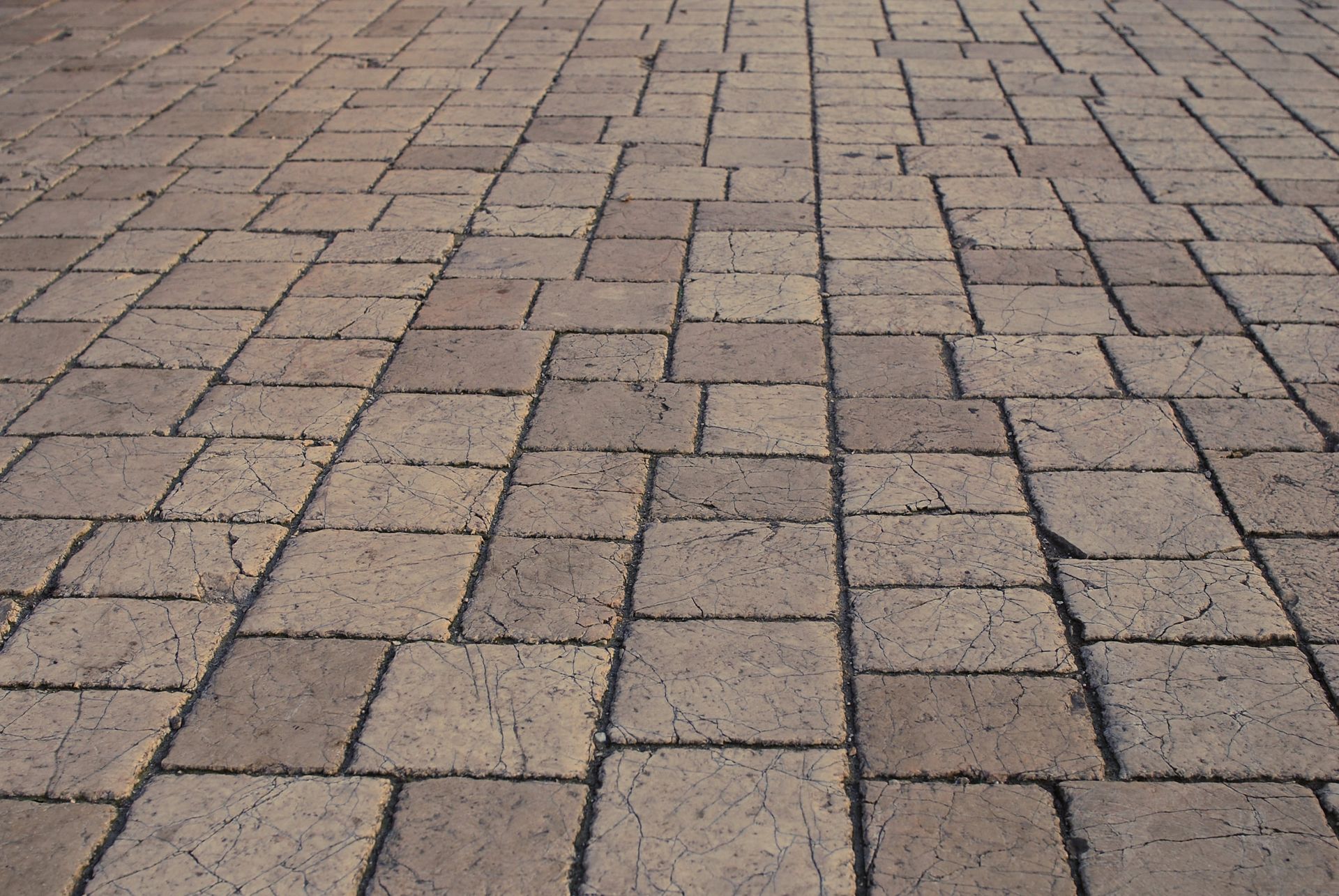
August 3, 2024
Concrete floors have come a long way from their purely utilitarian origins. These enhancements can transform concrete floors into stunning works of art, adding unique character and sophistication to any space. In this blog, we'll explore various ways to customize concrete floors and the benefits of incorporating these decorative elements. Inlays: Adding Intricate Details Inlays are a fantastic way to introduce intricate designs and details into concrete floors. These can be created using various materials, including metals, stones, tiles, and even wood, to create striking contrasts and unique patterns. Metal Inlays: Metals like brass, copper, and stainless steel can be embedded into concrete to create sleek lines, geometric patterns, or artistic designs. Metal inlays add a touch of modern elegance and can be used to highlight architectural features or create focal points. Stone and Tile Inlays: Natural stones and tiles can be incorporated into concrete floors to create beautiful mosaics, borders, or medallions. This technique is ideal for adding texture and color, and it works well in both traditional and contemporary settings. Wood Inlays: Combining the warmth of wood with the industrial look of concrete results in a unique and visually appealing floor. Wood inlays can be used to create intricate patterns or simple accents, adding a touch of rustic charm to modern spaces. Patterns: Creating Visual Interest Patterns can significantly enhance the visual appeal of concrete floors. From subtle designs to bold statements, patterned concrete floors can suit any style or preference. Stamped Patterns: Stamping is a popular technique where patterns are pressed into freshly poured concrete to mimic the appearance of brick, stone, tile, or even wood. This method provides the look of high-end materials without the associated costs. Stenciled Designs: Stenciling allows for the creation of detailed patterns and designs on concrete floors. Using stencils, intricate motifs, logos, or artistic elements can be applied, making each floor a unique masterpiece. Engraving: Engraving involves carving designs directly into the concrete surface. This technique can produce detailed and precise patterns, perfect for adding logos, custom artwork, or decorative borders. Decorative Elements: Enhancing Aesthetics Beyond inlays and patterns, various decorative elements can be used to customize concrete floors, enhancing their beauty and functionality. Stains and Dyes: Concrete stains and dyes are available in a wide range of colors, allowing for endless customization. Acid-based stains react with the concrete to create natural, variegated colors, while water-based stains and dyes offer more consistent and vibrant hues. Polishing: Polished concrete floors have a sleek, reflective surface that enhances the overall aesthetic of any space. Polishing can be combined with inlays, stains, and patterns to create a sophisticated and modern look. Epoxy Coatings: Epoxy coatings provide a durable, high-gloss finish that can be customized with colors, metallic pigments, and even embedded objects like glitter or colored glass. Epoxy floors are not only visually stunning but also resistant to wear and tear. Benefits of Customizing Concrete Floors Customizing concrete floors with inlays, patterns, and decorative elements offers numerous benefits: Unique Aesthetics: Customized concrete floors can reflect personal style and taste, creating unique and memorable spaces. Durability: Concrete floors are known for their durability, and with proper customization techniques, they can withstand heavy traffic and wear while maintaining their beauty. Low Maintenance: Customized concrete floors are easy to maintain, requiring minimal upkeep to keep them looking their best. Cost-Effective: Compared to other high-end flooring options, customized concrete floors can be more affordable while offering similar aesthetic and functional benefits. Conclusion Customizing concrete floors with inlays, patterns, and decorative elements opens up a world of creative possibilities. At Stone Mountain Concrete Co., we specialize in transforming concrete floors into stunning, one-of-a-kind surfaces that enhance the beauty and functionality of any space. Whether you're looking for a sleek, modern design or a warm, rustic charm, our team of experts can help you achieve your vision. For more information or to discuss your project, contact Stone Mountain Concrete Co. today. Let us help you explore the endless potential of customized concrete floors.
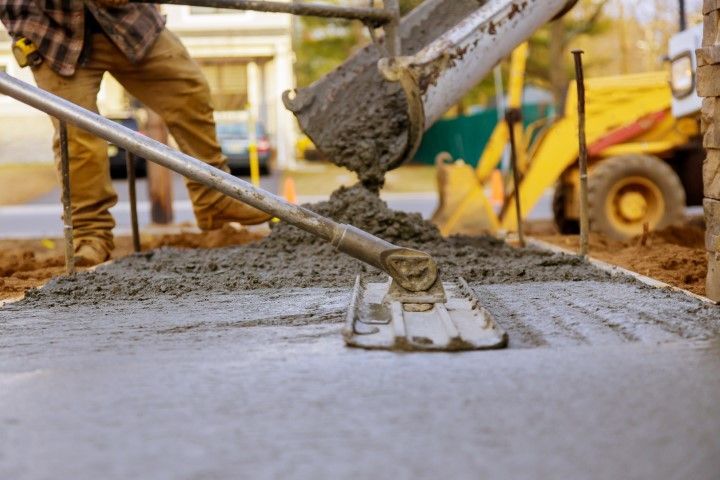
July 27, 2024
Today, they are celebrated for their versatility, durability, and aesthetic appeal. In this blog, we'll explore how concrete floors are being integrated into contemporary architectural designs and the myriad benefits they offer. Versatility in Design One of the most compelling aspects of concrete floors is their incredible versatility. Unlike traditional flooring materials, concrete can be customized to achieve a wide range of finishes, colors, and textures. This adaptability makes it a favorite among architects and designers who seek to create unique and innovative spaces. Polished Concrete: Achieving a sleek, high-gloss finish, polished concrete floors add a modern and sophisticated look to any space. This finish is perfect for contemporary homes, offices, and retail environments. Stained Concrete: Through staining, concrete floors can mimic the appearance of more expensive materials like marble or natural stone. This technique allows for the creation of rich, vibrant colors and intricate patterns. Stamped Concrete: Stamping involves pressing patterns into freshly poured concrete to replicate the look of brick, slate, or tile. This method is often used in both indoor and outdoor settings to create visually stunning floors. Exposed Aggregate: By exposing the aggregate within the concrete, designers can achieve a textured and visually interesting surface. This finish is ideal for adding a rustic or industrial touch to modern designs. Aesthetic Appeal Concrete floors are no longer seen as cold and utilitarian. With advancements in finishing techniques, they can now exude warmth and elegance. Their ability to blend seamlessly with various design styles makes them an excellent choice for modern architecture. Minimalist Designs: Concrete floors are a staple in minimalist design, providing a clean and uncluttered look. Their neutral tone allows other design elements, such as furniture and artwork, to stand out. Industrial Chic: The raw, unfinished look of concrete floors fits perfectly with the industrial chic aesthetic. Paired with exposed beams, ductwork, and metal accents, concrete floors can create a bold and stylish environment. Luxury Interiors: High-end homes and commercial spaces are increasingly incorporating polished and stained concrete floors. These floors can add a touch of luxury and sophistication, especially when combined with upscale materials like glass, steel, and natural stone. Durability and Longevity Concrete floors are renowned for their durability. They can withstand heavy foot traffic, resist scratches and stains, and last for decades with minimal maintenance. This longevity makes them an attractive option for both residential and commercial spaces. High Traffic Areas: In commercial settings such as retail stores, restaurants, and office buildings, concrete floors can handle the wear and tear of daily use while maintaining their aesthetic appeal. Residential Spaces: Homeowners appreciate the durability of concrete floors in high-traffic areas like kitchens, living rooms, and hallways. The low maintenance requirements make them a practical choice for busy households. Sustainability As sustainability becomes a priority in architectural design, concrete floors offer several environmental benefits. Thermal Mass: Concrete's thermal mass can help regulate indoor temperatures by absorbing and slowly releasing heat. This property can reduce the need for heating and cooling, leading to energy savings. Longevity and Reduced Waste: The long lifespan of concrete floors means fewer replacements and less waste over time. This durability contributes to a more sustainable building lifecycle. Recycled Materials: Concrete can be made using recycled materials such as fly ash, slag, and recycled aggregates. This practice reduces the environmental impact of new construction. Cost-Effectiveness Concrete floors can be a cost-effective option compared to other high-end flooring materials. While the initial installation cost may be higher than some alternatives, the long-term savings from reduced maintenance and replacement costs make concrete a financially sound investment. Conclusion Concrete floors play a pivotal role in modern architectural design, offering unparalleled versatility, aesthetic appeal, durability, and sustainability. At Stone Mountain Concrete Co., we are committed to helping you explore the endless possibilities of concrete flooring. Whether you're designing a contemporary home, a chic commercial space, or an industrial-inspired interior, our team of experts can help you achieve the perfect look. For more information or to discuss your project, contact Stone Mountain Concrete Co. today. Let us help you transform your space with the timeless elegance and practicality of concrete floors.
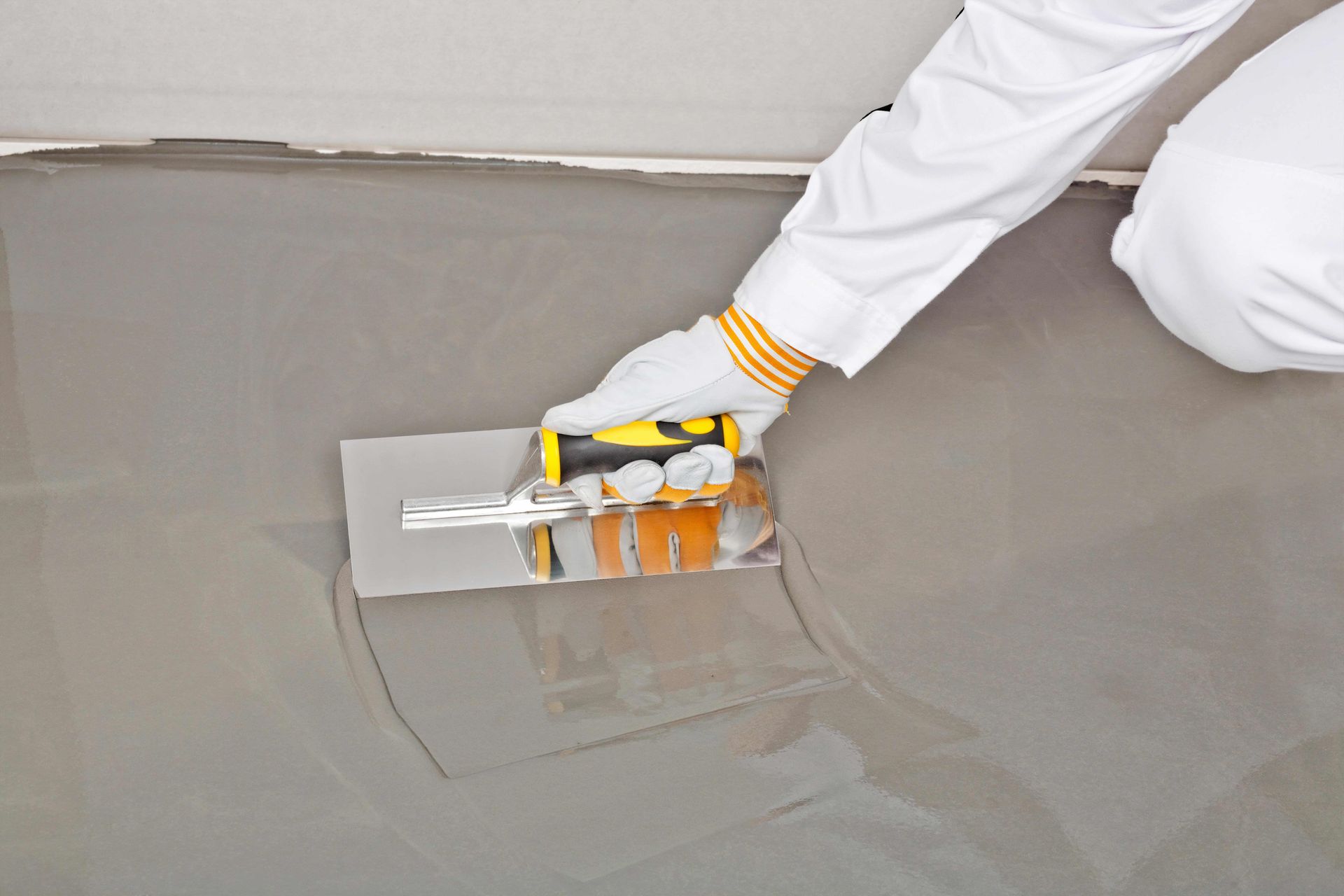
July 20, 2024
Concrete floors have gained immense popularity in both residential and commercial spaces due to their durability, versatility, and modern aesthetic. However, several myths and misconceptions about concrete flooring persist. In this blog, we'll debunk these common myths to help you make informed decisions about using concrete floors in your home or business. Myth 1: Concrete Floors Are Cold and Uncomfortable Reality: While it's true that concrete can feel cooler than other flooring materials, this characteristic can be advantageous, especially in warm climates. Additionally, concrete floors can be combined with radiant heating systems to provide a comfortable and warm surface during colder months. Area rugs and mats can also add warmth and comfort to concrete floors, making them suitable for any climate. Myth 2: Concrete Floors Are Dull and Unattractive Reality: Modern concrete flooring offers a wide range of design options that can match any aesthetic preference. From polished finishes and stains to stamped patterns and decorative overlays, concrete floors can be customized to look like high-end materials such as marble, granite, or even wood. The versatility of concrete allows for creative designs that can enhance the beauty of any space. Myth 3: Concrete Floors Are Prone to Cracking Reality: While concrete can crack, proper installation techniques and maintenance can minimize the risk. Professional concrete contractors use reinforcement methods, such as rebar or wire mesh, and control joints to manage and reduce cracking. Additionally, modern concrete mixtures are designed to be more durable and resistant to cracking than older versions. Myth 4: Concrete Floors Are Difficult to Maintain Reality: Concrete floors are actually quite easy to maintain. Regular sweeping and occasional mopping with a neutral cleaner are usually sufficient to keep them looking great. For polished concrete, periodic re-polishing can maintain the shine. Sealers can also be applied to protect the surface from stains and spills, making maintenance even easier. Myth 5: Concrete Floors Are Only Suitable for Industrial Spaces Reality: While concrete floors are indeed popular in industrial settings due to their durability, they are also an excellent choice for residential and commercial spaces. Concrete floors can be finished to be sleek and sophisticated, making them suitable for modern homes, offices, retail stores, and restaurants. Their ability to blend seamlessly with various design styles makes them a versatile flooring option. Myth 6: Concrete Floors Are Environmentally Unfriendly Reality: Concrete floors can be an environmentally friendly option, especially when using sustainable materials and practices. Concrete can be made with recycled materials, and its long lifespan reduces the need for frequent replacements, which helps conserve resources. Additionally, concrete's thermal mass can help regulate indoor temperatures, potentially reducing energy consumption for heating and cooling. Myth 7: Concrete Floors Are Too Expensive Reality: The cost of concrete floors can vary depending on the complexity of the design and the size of the area being covered. However, when compared to other high-end flooring options, concrete is often more cost-effective. Its durability and low maintenance requirements also mean that it can save money in the long run by reducing the need for repairs and replacements. Conclusion Concrete floors offer a multitude of benefits that make them an excellent choice for both residential and commercial spaces. By addressing and debunking these common myths, we hope to provide a clearer understanding of the advantages of concrete flooring. If you're considering concrete floors for your next project, consult with professionals to explore the various design and installation options available. For more information or to discuss your specific needs, feel free to contact Stone Mountain Concrete Co. Our team of experts is here to help you achieve the perfect concrete floor for your space.
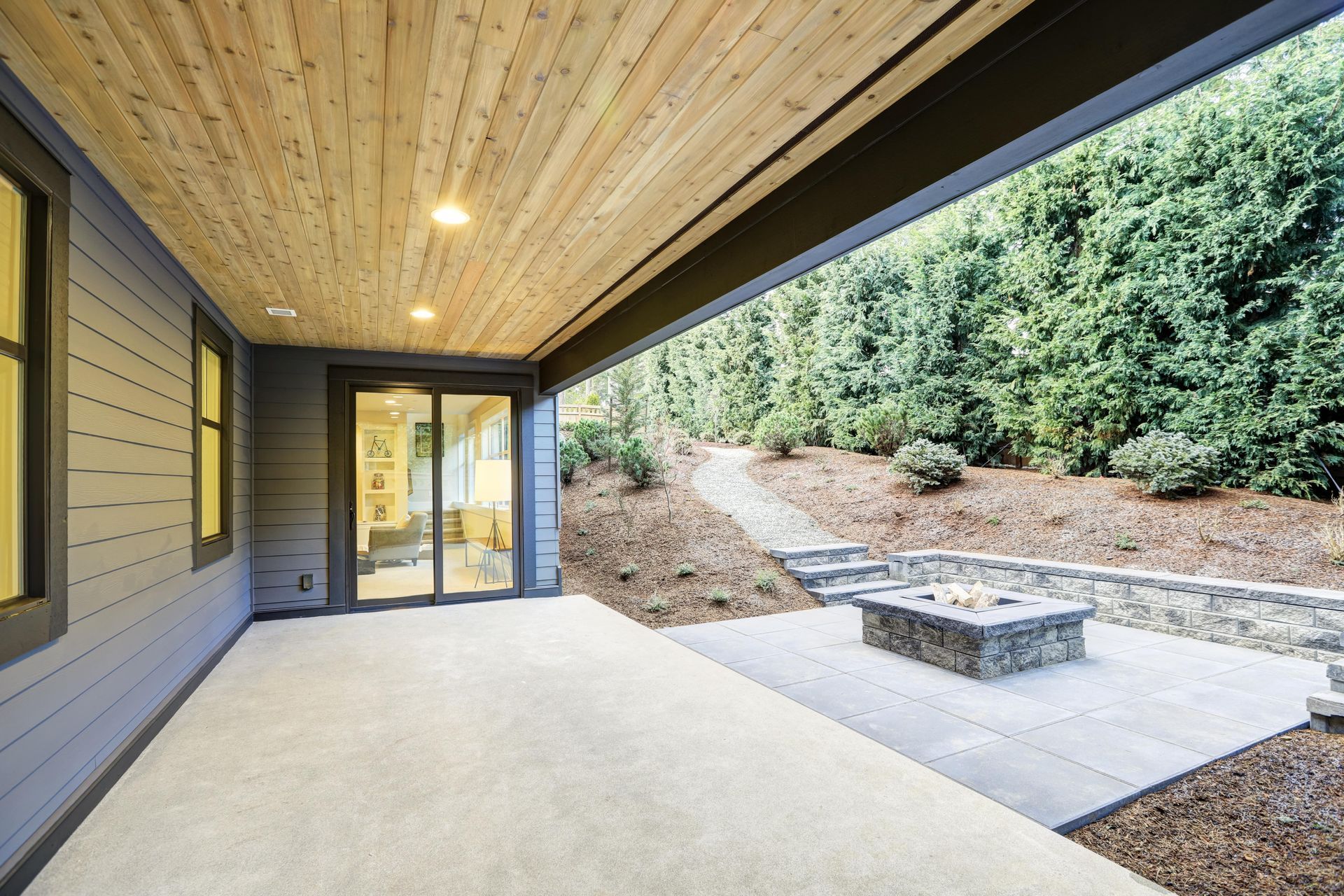
July 13, 2024
A well-maintained concrete patio can be a beautiful and functional addition to any home, providing a perfect space for outdoor relaxation, entertainment, and activities. At Stone Mountain Concrete, we understand the value of keeping your concrete patio in top shape to ensure its durability and longevity. Here’s a comprehensive guide on how to maintain your concrete patio and keep it looking great for years to come. 1. Regular Cleaning Keeping your concrete patio clean is the first step in maintaining its longevity. Dirt, debris, and organic matter can accumulate on the surface, leading to stains and potential damage. Regular sweeping and washing will help keep your patio clean and prevent the buildup of harmful materials. Sweep Regularly: Use a broom to sweep away leaves, dirt, and debris. This simple task can prevent staining and keep your patio looking tidy. Wash Periodically: Use a garden hose with a nozzle to wash down the patio. For a deeper clean, consider using a mild detergent and a scrub brush. Avoid using harsh chemicals that can damage the concrete. 2. Seal Your Patio Sealing your concrete patio is an essential step in protecting it from the elements. A good quality sealer will create a protective barrier against water, stains, and UV rays, preventing damage and extending the life of your patio. Choose the Right Sealer: Select a sealer that is suitable for your specific type of concrete and climate. At Stone Mountain Concrete, we can recommend the best sealer for your patio. Apply the Sealer Properly: Follow the manufacturer’s instructions for application. Typically, this involves cleaning the surface thoroughly, applying the sealer with a brush or roller, and allowing it to dry completely. Reapply as Needed: Depending on the sealer used, you may need to reapply it every 1-3 years to maintain optimal protection. 3. Address Stains Promptly Stains from oil, grease, food, and other substances can mar the appearance of your concrete patio and cause long-term damage if not addressed promptly. Act Quickly: The sooner you address a stain, the easier it will be to remove. Blot up any spills immediately to prevent them from penetrating the concrete. Use Appropriate Cleaners: For oil and grease stains, use a degreaser or a specially formulated concrete cleaner. For organic stains like leaves or food, a mild detergent and water may suffice. Test Before Using: Always test any cleaner on a small, inconspicuous area before applying it to the entire stain to ensure it does not damage the concrete. 4. Protect from Weather Extremes Concrete patios are exposed to various weather conditions that can cause wear and tear over time. Taking steps to protect your patio from extreme weather can significantly extend its lifespan. Cover During Harsh Weather: Use a tarp or patio cover to protect your concrete from heavy rain, snow, or prolonged sun exposure. This helps prevent water infiltration and UV damage. Remove Snow and Ice Carefully: Avoid using metal shovels or harsh chemicals to remove snow and ice, as these can damage the concrete surface. Opt for a plastic shovel and non-corrosive de-icers. 5. Prevent Cracks Cracks in your concrete patio can lead to more significant issues if not addressed promptly. Preventing cracks and repairing them early can save you time and money in the long run. Control Joints: Ensure that your patio has proper control joints to manage the natural expansion and contraction of the concrete. Avoid Heavy Loads: Refrain from placing excessively heavy objects on your patio that could cause cracking. Repair Small Cracks: For small cracks, use a concrete patching compound to fill and seal them. This prevents water from entering and causing further damage. 6. Regular Inspections Performing regular inspections of your concrete patio allows you to identify and address potential issues before they become major problems. Check for Damage: Look for signs of wear, cracks, stains, or any other damage. Pay close attention to high-traffic areas and edges. Maintain Landscaping: Ensure that surrounding landscaping is well-maintained to prevent roots from undermining the patio or vegetation from causing stains and damage. Conclusion Maintaining your concrete patio is essential for ensuring its longevity and preserving its aesthetic appeal. By following these tips, you can protect your investment and enjoy your outdoor space for many years. At Stone Mountain Concrete, we’re dedicated to helping you keep your patio in the best possible condition. If you have any questions or need professional assistance, don’t hesitate to contact us. Together, we can ensure your concrete patio remains a beautiful and durable feature of your home.
LET'S WORK TOGETHER
Stone Mountain Concrete
Stone Mountain, GA 30083, United States of America
(404) 905-1594
Hours
- Mon - Fri
- -
- Saturday
- -
- Sunday
- Closed
QUICK LINKS
© 2025
All Rights Reserved | Stone Mountain Concrete
